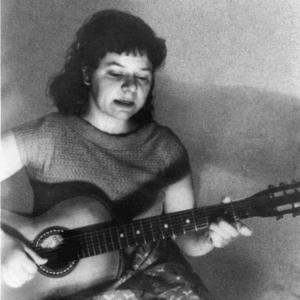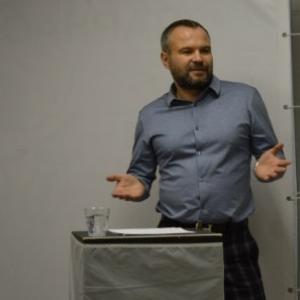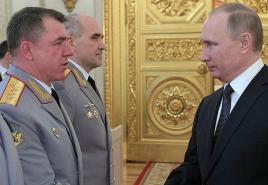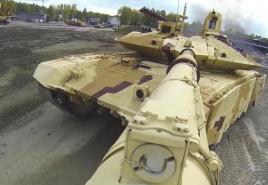But they are alive forever in the treasury of people's memory. Analysis of Akhmatova’s poem “Five years have passed - and the wounds have healed...”
The beginning of the Great Patriotic War I met Akhmatova in Leningrad, but doctors insisted that the then 52-year-old poetess leave her beloved city. This was followed by a series of moves - from Northern capital to Moscow, then to Chistopol, from there Anna Andreevna went through Kazan to Tashkent. She returned to the city on the Neva at the first opportunity - at the end of May 1944. During the Great Patriotic War, the poetess did not stop writing. Her poems are imbued with sincere patriotic pathos and intense pain for those who died in the battles for freedom; they contain calls to fight against the Nazi invaders. Among the most famous works are “The Oath” (1941), “Courage” (1942), “To the Winners” (1944).
Anna Andreevna returned to the theme of the war even after its completion. For example, in the poem “Five years have passed, and the wounds have healed...”, written in May 1950. The text is part of the “Glory to the World” cycle, in which Akhmatova praised Stalin. Naturally, there is not an ounce of sincerity in him. The poetess had to write odes to the leader of the peoples for the sake of
the release of his son, Lev Nikolaevich Gumilyov, from prison. Anna Andreevna was very ashamed of the works included in the cycle. Most likely, it was not just Stalin. Akhmatova, who wrote to order, wrote poorly and falsely. As Lidia Korneevna Chukovskaya correctly noted, any artisan could have coped with the task better.
The poem “Five years have passed, and the wounds have healed...” talks about a country gradually restoring life after the devastating Great Patriotic War. Life is picking up speed again - a peaceful tractor has taken the place of the tank; where once there was a fire, now the garden is fragrant; Cars drive freely along the formerly rutted road; the mother, whose heart ached from separation during the war, sings, rocking the cradle. It is stupid to deny Akhmatova’s genius, but it is also stupid to deny the falsehood that permeates the text in question. It is enough at least that some of the vocabulary chosen for the work is alien to Anna Andreevna. In particular, we are talking about the above-mentioned tractors and flying light cars. At the same time, there are a couple of truly wonderful lines in the poem:
...And Russian glades
Again full of icy silence.
Such a subtle observation - it turns out that the clearings, lost among the trees, cannot be called empty, because they are filled with icy silence - a sign of a brilliant poet, which Akhmatova was.
Other works on this topic:
- Akhmatova met the beginning of the Great Patriotic War in Leningrad. She had no intention of leaving her beloved city, but doctors insisted on evacuation. As a result, the 52-year-old poetess in September...
- Akhmatova met the beginning of the Great Patriotic War in Leningrad. A few months later, doctors insisted that the 52-year-old poetess go to evacuation. Without wanting it...
- Akhmatova became acquainted with the works of the great writer Franz Kafka no later than 1959. There were no official publications in Russian at that time. The poetess read the novel “The Trial”...
- The poem “To Fellow Citizens” opens Akhmatova’s fifth collection, “Anno Domini MCMXXI,” published in 1922. Soviet censorship cut out the page with him from almost all copies of the book....
- In the early 1920s, Chukovsky gave a lecture “Two Russias”. Subsequently, it became the basis for his article “Akhmatova and Mayakovsky.” Korney Ivanovich called Anna Andreevna careful...
- Poetess Anna Akhmatova lived an amazingly bright life, full of tragedy, ups and downs. She happened to witness several eras, as one of the most odious and...
- In April 1921, the publishing house “Petropolis” published Akhmatova’s third collection, called “Plantain” and printed in a thousand copies. Among the poems included in the book...
Anna Andreevna Akhmatova
Five years have passed, and the wounds have healed,
Cruel inflicted by war,
My country
and Russian glades
And lighthouses through the darkness of the seaside night,
Showing the way to the sailor, they burn.
On their fire, as in friendly eyes,
Sailors are looking far from the sea.
Where the tank thundered, there is now a peaceful tractor,
Where the fire howled, the garden smells fragrant,
And along the once dug path
Cars fly lightly.
Where is the oil for crippled hands?
They called for vengeance - the spruce is turning green,
And where the heart ached from separation,—
There the mother sings, rocking the cradle.
You have become powerful and free again,
My country!
But alive forever
In the treasury of people's memory
War-ravaged years.
For the peaceful life of younger generations,
From the Caspian Sea to polar ice,
Like monuments of scorched villages,
Masses of new cities are rising.

Akhmatova met the beginning of the Great Patriotic War in Leningrad, but doctors insisted that the then 52-year-old poetess leave her beloved city. This was followed by a series of moves - from the Northern capital to Moscow, then to Chistopol, from there Anna Andreevna went through Kazan to Tashkent.


She returned to the city on the Neva at the first opportunity - at the end of May 1944. During the Great Patriotic War, the poetess did not stop writing. Her poems are imbued with sincere patriotic pathos and intense pain for those who died in the battles for freedom; they contain calls to fight against the Nazi invaders. Among the most famous works are “The Oath” (1941), “Courage” (1942), “To the Winners” (1944).
Anna Andreevna returned to the theme of the war even after its completion. For example, in the poem “Five years have passed, and the wounds have healed...”, written in May 1950. The text is part of the “Glory to the World” cycle, in which Akhmatova praised Stalin. Naturally, there is not an ounce of sincerity in him. The poetess had to write odes to the leader of the peoples in order to free her son, Lev Nikolaevich Gumilyov, from prison.

Lev Gumilev

Anna Andreevna was very ashamed of the works included in the cycle. Most likely, it was not just Stalin. Akhmatova, who wrote to order, wrote poorly and falsely. As Lidia Korneevna Chukovskaya correctly noted, any artisan could have coped with the task better.
The poem “Five years have passed, and the wounds have healed...” talks about a country gradually restoring life after the devastating Great Patriotic War. Life is gaining momentum again - a peaceful tractor has taken the place of the tank; where once there was a fire, now the garden is fragrant; Cars drive freely along the formerly rutted road; the mother, whose heart ached from separation during the war, sings, rocking the cradle. It is stupid to deny Akhmatova’s genius, but it is also stupid to deny the falsehood that permeates the text in question. It is enough at least that some of the vocabulary chosen for the work is alien to Anna Andreevna. In particular, we are talking about the above-mentioned tractors and flying light cars. At the same time, there are a couple of truly wonderful lines in the poem:
...And Russian glades
Again full of icy silence.
Such a subtle observation - it turns out that the clearings, lost among the trees, cannot be called empty, because they are filled with icy silence - a sign of a brilliant poet, which Akhmatova was.
“Five years have passed - and the wounds have healed...” Anna Akhmatova
Five years have passed, and the wounds have healed,
Cruel inflicted by war,
My country
and Russian gladesAnd lighthouses through the darkness of the seaside night,
Showing the way to the sailor, they burn.
On their fire, as in friendly eyes,
Sailors are looking far from the sea.Where the tank thundered, there is now a peaceful tractor,
Where the fire howled, the garden smells fragrant,
And along the once dug path
Cars fly lightly.Where is the oil for crippled hands?
They called for vengeance - the spruce turned green,
And where the heart ached from separation, -
There the mother sings, rocking the cradle.You have become powerful and free again,
My country!
But alive forever
In the treasury of people's memory
War-ravaged years.For the peaceful life of younger generations,
From the Caspian Sea to the polar ice,
Like monuments of scorched villages,
Masses of new cities are rising.
Analysis of Akhmatova’s poem “Five years have passed - and the wounds have healed...”
Akhmatova met the beginning of the Great Patriotic War in Leningrad, but doctors insisted that the then 52-year-old poetess leave her beloved city. This was followed by a series of moves - from the Northern capital to Moscow, then to Chistopol, from there Anna Andreevna went through Kazan to Tashkent. She returned to the city on the Neva at the first opportunity - at the end of May 1944. During the Great Patriotic War, the poetess did not stop writing. Her poems are imbued with sincere patriotic pathos and intense pain for those who died in the battles for freedom; they contain calls to fight against the Nazi invaders. Among the most famous works are “” (1941), “” (1942), “To the Winners” (1944).
Anna Andreevna returned to the theme of the war even after its completion. For example, in the poem “Five years have passed, and the wounds have healed...”, written in May 1950. The text is part of the “Glory to the World” cycle, in which Akhmatova praised Stalin. Naturally, there is not an ounce of sincerity in him. The poetess had to write odes to the leader of the peoples in order to free her son, Lev Nikolaevich Gumilyov, from prison. Anna Andreevna was very ashamed of the works included in the cycle. Most likely, it was not just Stalin. Akhmatova, who wrote to order, wrote poorly and falsely. As Lidia Korneevna Chukovskaya correctly noted, any artisan could have coped with the task better.
The poem “Five years have passed, and the wounds have healed...” talks about a country gradually restoring life after the devastating Great Patriotic War. Life is picking up speed again - a peaceful tractor has taken the place of the tank; where once there was a fire, now the garden is fragrant; Cars drive freely along the formerly rutted road; the mother, whose heart ached from separation during the war, sings, rocking the cradle. It is stupid to deny Akhmatova’s genius, but it is also stupid to deny the falsehood that permeates the text in question. It is enough at least that some of the vocabulary chosen for the work is alien to Anna Andreevna. In particular, we are talking about the above-mentioned tractors and flying light cars. At the same time, there are a couple of truly wonderful lines in the poem:
...And Russian glades
Again full of icy silence.
Such a subtle observation - it turns out that the clearings, lost among the trees, cannot be called empty, because they are filled with icy silence - a sign of a brilliant poet, which Akhmatova was.







